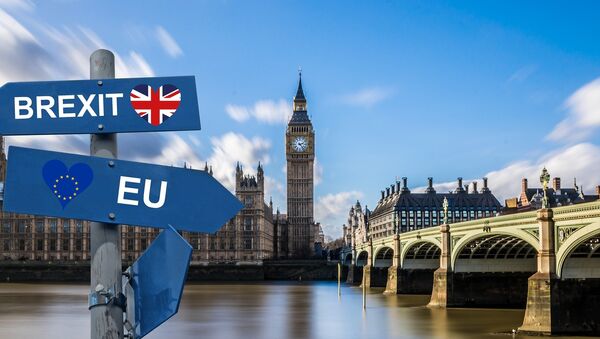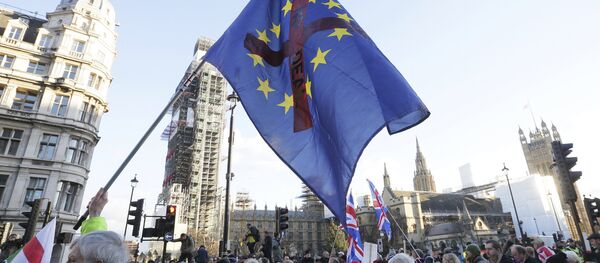In an interview with newspapers of Germany's Funke media group, EU Budget Commissioner Gunther Oettinger warned that Berlin could face a hefty bill in case of a "hard" Brexit, something that may stand at what he described as "the mid-three digit range" of hundreds of millions of euros.
The statement comes after a spokesperson for UK Prime Minister Theresa May said earlier in December that May is "prepared to take the UK out of the EU with no deal". The spokesperson also said that May said earlier that the parliament would have a chance to vote on May's Brexit plan well before January 21 but not until Christmas break. It will reconvene on January 7.
READ MORE: Just 19% of Brits Think PM May's Brexit Deal Honours 2016 Referendum – Poll
Earlier this year, May defended a draft Brexit deal in the UK parliament's House of Commons. The agreement faced criticism both from the opposition and the ruling party, with several members of May's cabinet resigning over disagreements with the deal, including Brexit Secretary Dominique Raab and Foreign Secretary Boris Johnson.
The United Kingdom voted to leave the European Union in a referendum in June 2016 and is expected to do so by March 2019.
READ MORE: UK to Kick-Start No-Deal Brexit Preparations Due to Deadlock Situation
Oettinger, for his part, also warned that "if the UK leaves the bloc without a Brexit deal, it will become "a third country [sic] like Morocco or Azerbaijan".
He also expressed hope that at the end of the day, the draft Brexit deal would be approved by British lawmakers.
"It is not entirely unlikely that the British parliament will vote in January for the divorce agreement. For a disorderly Brexit or for a new referendum there is certainly no majority [in Britain]", Oettinger pointed out.
He argued that even though the likelihood of the UK remaining in the EU had "somewhat increased" in the past few months, "nevertheless, I assume there will be a [British] withdrawal [from the bloc] at the end of March".
READ MORE: 'She Selling It Double': May Promoting Brexit Deal as Least Worst Option — Prof
The statement followed May calling off a vote in parliament on the terms of the exit from the EU after it became clear that her hard-negotiated Brexit deal would be overwhelmingly rejected.
The United Kingdom voted to leave the European Union in a referendum in June 2016 and is expected to do so by March 2019.
Macron a 'Strong Supporter' of the EU
Separately, Oettinger touched upon the French budget deficit, which is above the EU's 3 percent ceiling this year, something that he said would be accepted by the bloc as a "one-time exception".
He described French President Emmanuel Macron as a "strong supporter of the European Union", although Macron "lost authority with his budget for 2019" by increasing his spending in response to the Yellow Jackets protests.
"It crucial now that Macron continues his reform agenda, especially in the labour market, and that France remains on its growth track. Under this condition, we will tolerate a national debt higher than 3 percent as a one-time exception. However, it must not continue beyond 2019", Oettinger concluded.
READ MORE: Analyst: 2nd Brexit Referendum Isn't Going to Happen Because of Sheer Logistics
The wave of the so-called yellow vests protests started in France in mid-November, after fuel prices hiked in the country. After a few rounds of clashes, the government agreed to scrap a planned diesel tax rise; however, the rallies continued as protesters put forward new demands, concerning broader policies.





